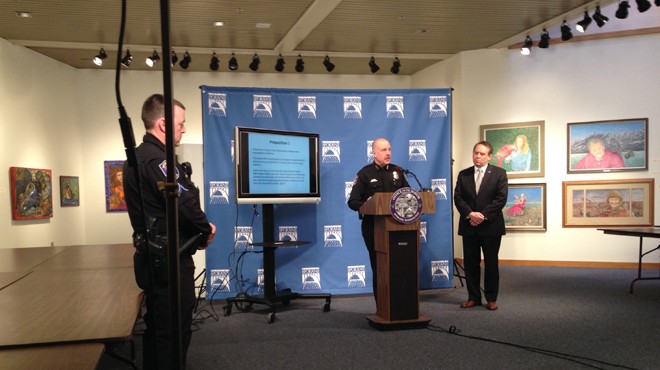Thursday, December 12, 2013
Town hall meeting on police oversight tonight
Everything you need to know about where we are in the fight over Spokane's police ombudsman
There was a moment last month when things seemed to be falling apart for Mayor David Condon.
The city council had, in a rushed emergency vote, unanimously rejected a contract agreement the mayor had spent 21 months hashing out with the Spokane Police Guild. Council members said it didn't do enough to strengthen the city's police ombudsman, whose power has been under scrutiny since the office was created in the aftermath of the death of Otto Zehm, an unarmed mentally ill man who died after a confrontation with Spokane police, landing an officer in federal prison.
Today, the ombudsman monitors misconduct investigations as an observer within the Internal Affairs process; many have called on the city to grant him the authority to investigate on his own outside of that process.
After the emergency vote, Council President Ben Stuckart, impatient and frustrated, told the Inlander the agreement didn't meet "what everybody's been working toward for five goddamn years." A statement from the mayor's office told the media, "Now we start over." Lawmakers and activists speculated about how long it would take the mayor to renegotiate a brand new agreement with the guild. Another year?
But now, things look very different. City Hall seems to be lining up behind the mayor and his plan for an ombudsman who would now be overseen by a citizen commission but whose actual authorities will not change. Council members say they're still waiting to hear more public input, but, as we reported last week, even Councilman Steve Salvatori, one of the most vocal proponents of a stronger ombudsman, now supports Condon's plan.
Tonight brings the final installment of the mayor's push to sell his plan to the public: a town hall meeting at the West Central Community Center (1603 N. Belt) at 6 pm. He'll present his latest plan and take public testimony. The council will vote Monday.
At issue here are several big questions.
First: What type of ombudsman is most effective? Because of state law, most people agree anything the ombudsman might uncover outside the scope of an Internal Affairs investigation could not be factored into officer discipline. The ombudsman would also be unable to require that an officer testify (that power belongs to the chief). That reality has led some, like the mayor and Police Chief Frank Straub, to argue that an ombudsman working inside the Internal Affairs process is more effective than one who works independently. But others argue an independent ombudsman would be at least as effective and, more importantly, seemingly more impartial on the public's behalf.
"As a function of human nature, individuals who are part of a group are more likely to favor the interests of the group over 'outsiders,'" wrote the Use of Force Commission in its final report to the city. "In the context of an investigation into a fellow group member’s alleged misconduct, the peer investigator is apt to be more selective about the investigation’s scope and depth, and may be inclined to avoid a transparent process. All of this behavior can compromise the quality of the investigation and negatively impact the public’s trust in the process and the institution."
Regardless, the process of the ombudsman working within the department's Internal Affairs process was already in place at this time last year, which brings us to the next question.
What were voters asking for when they passed Proposition 1? If they were satisfied with the process of the ombudsman investigating officers within the Internal Affairs process, why did they seek a charter amendment? Throughout this debate, many cite a February special election in which 70 percent of city voters supported changing the city charter to add new investigative authority as well as a citizen oversight commission to the Office of the Police Ombudsman. That language, calling for a "totally independent" ombudsman, can be found here.
In explaining their newest plan, the mayor and chief have continually said the definition of independence in this context is unclear and have pointed to these varying descriptions from all seven city council members. Meanwhile activists like those at the Peace and Justice Action League of Spokane and the nonprofit Center for Justice, have said it's obvious: voters want an ombudsman who works outside the Internal Affairs process.
Does state law limit how much Spokane can empower its police ombudsman? With legal challenges behind us, this may be the longest standing and most convoluted point of contention in this fight. Condon and Straub continually point to state law as a limit on getting what some are demanding. Straub has said proponents of an independent ombudsman need to take their fight to Olympia.
To be clear, the power of an independent ombudsman is certainly limited (see above) and union protections in Washington mandate that an employer (the city) bargain with its employees (the guild) in order to change working conditions. (Disagreements over what exactly is a change in working conditions are another layer of the issue.) But there is no state law forbidding the city from bargaining with the guild to craft a contract that would allow the ombudsman to investigate incidents outside the Internal Affairs process. Those calling for stronger, more independent oversight say that's what the mayor should have done: negotiated with the guild until he could get them to agree to an independent ombudsman. Just how much Condon's negotiating team may have asked for remains unclear as city representatives have declined to disclose details of those closed-door negotiations.
Condon's latest plan keeps the ombudsman working within the Internal Affairs process, creates the oversight commission, and includes a "relief valve" option giving the commission the ability to seek review of disputed investigations from an outside third party. More about the plan, which Salvatori called "as good as we're going to get," here.
Tonight's push is the third in a series of chances for public input ahead of the council vote. Condon presented the plan last week at a Community Assembly meeting (a formal meeting environment, where some citizens have complained they didn't get enough time to comment) and during a telephone town hall. Ahead of the phone call, during which city officials also discussed fire service, 40,000 city residents got automated calls from the mayor asking them to join the call. During the call, a moderator asked questions for which listeners could press a key to register their answer. Among them is this question, with answer choices that further highlight the divide in how the mayor and his opponents see this.
What is the most important element in making enhanced independent civilian police oversight successful?
a. Establishing an independent civilian Police Ombudsman Commission as oversight
b. Ability to consider information gained by the Ombudsman in officer discipline
c. Ability to conduct an investigation outside of the Internal Affairs process
d. Authorizing the Ombudsman to participate fully in all police Internal Affairs interviews, including asking unlimited questions, reviewing all investigative materials and expanding the scope as the Ombudsman deems necessary
In response, 51 percent of telephone voters chose option d. Condon has said he believes an ombudsman who operates within the departments internal process with access to all interviews (answer d), combined with an oversight commission, satisfies the "totally independent" ombudsman added to the city charter by Proposition 1. But others argue an ombudsman who does the same type of investigating — but does it outside the department (option c) — is critical. The city's current police ombudsman, Tim Burns, has told the Inlander he believes that independence is important to public trust.
In the end, the outcome of this is likely to strengthen the ombudsman in some way, as evidenced by this tepid endorsement from Pierce Murphy, previously the ombudsman in Boise and currently director of Seattle's Office of Professional Accountability. But just how much strengthening of independence does it take to get the council back on the mayor's side? That's yet to be seen.




















